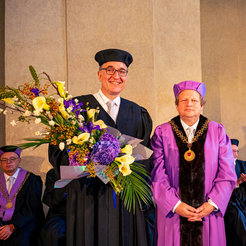Max Planck Director Peter H. Seeberger receives honorary doctorate
Personnel announcement
Peter H. Seeberger, Director at the Max Planck Institute of Colloids and Interfaces, received an honorary doctorate from the University of Chemistry and Technology in Prague (UCT) on September 23. The ceremony took place during the University’s 70th anniversary at the Strahov Monastery.

Chemist and biochemist Peter H. Seeberger held this award in recognition of his outstanding achievements in the field of glycoscience, vaccine development, green chemistry, and excellent collaboration with UCT Prague. "Receiving the honorary doctorate from UCT Prague is very special to me because this honor is rarely bestowed and the list of those who have been honored so far is impressive," said Prof. Dr. Dr. h. c. Peter H. Seeberger. The ceremony took place in the Strahov Monastery in the presence of high-ranking politicians and the Czech scientific elite. A Max Planck Partner Group between the Max Planck Institute of Colloids and Interfaces (MPIKG) and the University of Chemistry and Technology in Prague exists since October 2021. This partnership focuses on the development of novel sugar-based drugs and the networking of young students and researchers between Prague and Potsdam. Currently, the partner group led by Dr. Petra Menova is researching a receptor on liver cells with the goal of developing targeted drugs for the treatment of hepatitis B.
Since 2009, Peter H. Seeberger has headed the "Biomolecular Systems" department, whose eight research groups conduct research at the interface between chemistry and biology. The scientists use synthetic chemistry as an enabling technology to study complex biological systems, with a particular focus on glycobiology. Carbohydrates play a critical role in structure, energy storage, and molecular recognition processes essential to living organisms, as well as in infections, the immune response, and cancer development. Complex sugars form the basis for vaccines against bacteria, parasites and viruses. In addition to pioneering inventions in the synthesis of complex sugars, his department is continuously developing new automated synthesis methods for total drug synthesis. In addition to biological work on the breakdown of signal transduction, the focus is on research into the material properties of complex sugars. Basic research in the field of immunology has contributed to the development of vaccines. Vaccines against hospital germs are now nearing clinical development.
About the person
Seeberger's research has been published in more than 630 articles, five books and more than 50 patent families, and presented in more than 900 lectures. Among the more than 40 awards, the Emil Fischer Medal (2020), the Stifterverband Science Prize (2017), the Körber Prize for European Science (2007), and the Claude S. Huson Award of the American Chemical Society (2009) are particularly noteworthy. He has been an elected member of the Berlin-Brandenburg Academy of Sciences and Humanities since 2013 and Vice President of the DFG since 2021. He also teaches as a professor at Freie Universität Berlin and, since 2011, as an honorary professor at the University of Potsdam.












